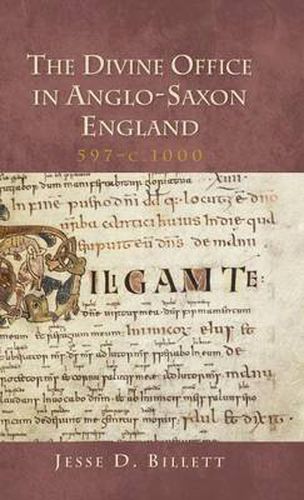Readings Newsletter
Become a Readings Member to make your shopping experience even easier.
Sign in or sign up for free!
You’re not far away from qualifying for FREE standard shipping within Australia
You’ve qualified for FREE standard shipping within Australia
The cart is loading…






At the heart of life in any medieval Christian religious community was the communal recitation of the daily hours of prayer or Divine Office. This book draws on narrative, conciliar, and manuscript sources to reconstruct the history of how the Divine Office was sung in Anglo-Saxon minster churches from the coming of the first Roman missionaries in 597 to the height of the monastic revival in the tenth century.
Going beyond both the hagiographic Benedictine assumptions of older scholarship and the cautious agnosticism of more recent historians of Anglo-Saxon Christianity, the author demonstrates that the early Anglo-Saxon Church followed a non-Benedictine Roman monasticliturgical tradition. Despite Viking depredations and native laxity, this tradition survived, enriched through contact with varied Continental liturgies, into the tenth century. Only then did a few advanced monastic reformers conclude, based on their study of ninth-century Frankish reforms fully explained for the first time in this book, that English monks and nuns ought to follow the liturgical prescriptions of the Rule of St Benedict to the letter. Fragmentary manuscript survivals reveal how monastic leaders such as Dunstan and AEthelwold variously adapted the native English liturgical tradition - or replaced it - to implement this forgotten central plank of the Benedictine Reform .
Jesse D. Billett is Assistant Professor in the Faculty of Divinity, Trinity College, Toronto.
$9.00 standard shipping within Australia
FREE standard shipping within Australia for orders over $100.00
Express & International shipping calculated at checkout
At the heart of life in any medieval Christian religious community was the communal recitation of the daily hours of prayer or Divine Office. This book draws on narrative, conciliar, and manuscript sources to reconstruct the history of how the Divine Office was sung in Anglo-Saxon minster churches from the coming of the first Roman missionaries in 597 to the height of the monastic revival in the tenth century.
Going beyond both the hagiographic Benedictine assumptions of older scholarship and the cautious agnosticism of more recent historians of Anglo-Saxon Christianity, the author demonstrates that the early Anglo-Saxon Church followed a non-Benedictine Roman monasticliturgical tradition. Despite Viking depredations and native laxity, this tradition survived, enriched through contact with varied Continental liturgies, into the tenth century. Only then did a few advanced monastic reformers conclude, based on their study of ninth-century Frankish reforms fully explained for the first time in this book, that English monks and nuns ought to follow the liturgical prescriptions of the Rule of St Benedict to the letter. Fragmentary manuscript survivals reveal how monastic leaders such as Dunstan and AEthelwold variously adapted the native English liturgical tradition - or replaced it - to implement this forgotten central plank of the Benedictine Reform .
Jesse D. Billett is Assistant Professor in the Faculty of Divinity, Trinity College, Toronto.